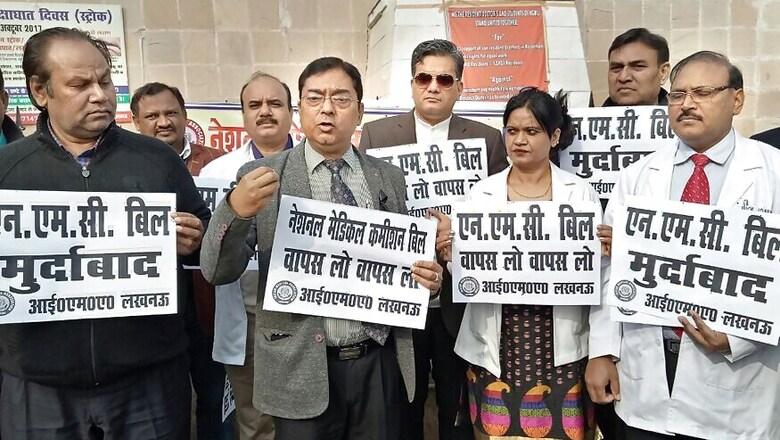
views
New Delhi: The public healthcare sector was brought to a standstill on Tuesday in opposition to the National Medical Commission (NMC) Bill. The protests came to a rest only after the bill was sent to the Parliamentary Standing Committee for further deliberation. However, medical professionals and the IMA is worried about the “complete lack of the social sector representation in the Commission”.
Unregulated seats, district hospitals being handed over to private medical colleges and a plethora of other issues in the new bill, led to the doctors disrupting hospital services for over 12 hours on Tuesday.
All doctors associated with the Indian Medical Association (IMA) are worried.
“It’s a step in the right direction,” said Dr Srinath Reddy, President, Public Health Foundation of India (PHFI). He said, “As the attempt to self-regulate has failed, we need to move to a different system. However, there are several shortcomings in the proposed bill and I am surprised by the lack of public sector representation.”
Under the current set of laws, doctors regulated themselves by electing members of their own community to the Medical Council of India (MCI), which the new bill seeks to replace with the National Medical Commission. As noted by the 92nd Parliamentary Standing Committee, the earlier regime led to extensive corruption in the MCI and a complete failure to reform medical education and fill the gaps in healthcare.
The committee’s report is the touchstone of all that went wrong in regulation and what has to be done. However, analysts say the bill fails to hold up in comparison.
“The underlying disease that caused corruption in MCI was the exorbitant fee private medical colleges were allowed to charge,” said Dr. Abhay Shukla, part of the Jan Swasthya Abhiyan, a civil society collection of health networks.
“This Commission will allow medical colleges to keep 60 percent of the seats to themselves with only 40 percent of the seats up for regulation. Unregulated medical seats in India have been the reason behind many unethical practices in the country such as corruption in the name of ‘donations’. Instead of checking this lucrative business, the Commission will only legalise it,” said Shukla.
“What kind of a doctor will a person turn out to be produced if he has paid Rs 50 lakh- 1 crore for a college seat,” said Shukla.
The Parliamentary Committee noted the skewed distribution of medical colleges across India, with medical colleges being concentrated in the southern states and a sparse presence in the north.
“However, the move to let private players run medical colleges in existing district hospitals to plug this gap may make healthcare unaffordable for those who depend on these hospitals,” said Shukla.
Establishing hospitals where there aren’t any, needs to be a public sector responsibility, said who was an expert involved in the earlier iterations of a draft bill, which came about after former President Pratibha Patil spoke of one in her first Presidential Address.
While that draft, said the expert, was never cleared by the Parliament, it was fully supported by most states as they were ‘fed up’ with the MCI.
This bill, the experts feared was stepping into territories much beyond its mandate and capability.
One of the key jobs of the NMC would be to regulate research in the country, a wide field that comes under the Department of Health Research, the Indian Council of Medical Research and Department of Science and Technology.
Similarly, the bill seeks to look after healthcare infrastructure too, which comes under the domain of the Union health ministry.
Shukla is of the opinion that students are also going to suffer in the new exit examination for MBBS graduates if the NMC allows colleges to be set up without prior checking of standards and requirements.
As for the controversial bridge examination that will allow AYUSH practitioners to come in to the allopathy fold, Shukla pointed out that it may end up depleting the number of AYUSH professionals, as too many may want to make the move.
The IMA works with a guild mentality of being the only ones who can practice modern medicine, said Shukla.
“If the government is serious about promoting AYUSH then they need to give the doctors proper infrastructure, training and medicines and then make them work in the public sector for a few years. AYUSH doctors trained in modern medicine could make up for the shortage of MBBS doctors in primary health centres (PHCs), instead of overcrowding urban markets,” Shukla suggested.




















Comments
0 comment